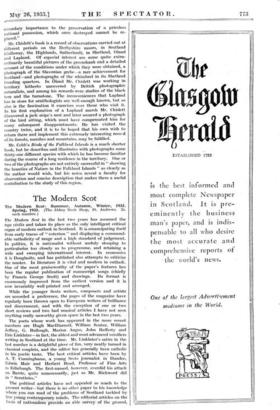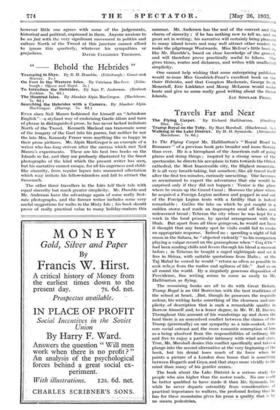The Modern Scot
The Modern Scot: Summer, Autumn, Whiter, 1932. Spring, 1933. (The Abbey Book Shop, St. Andrews. 2s. each number.) The Modern Scot in the last two years has assumed the toga virilis and taken its place as the only intelligent critical organ of modern outlook in Scotland. It is emancipating itself from early traces of " coteristn " and displaying a commend- able catholicity of range and a high standard of judgement. In politics, it is nationalist without unduly stooping to particularize too closely as to programme, and retaining a wide and sweeping international interest. In economics it is Douglasite, and has published also attempts to criticize the master. In literature it is vital and modern in outlook. One of the most praiseworthy of the paper's features has been the regular publication of manuscript songs (chiefly by Francis George Scott) and drawings. Its format is enormously improved from the earliest version and it is now invariably well printed and arranged.
While the younger Scots writers, composers and artists are accorded a preference, the pages of the magazine have regularly been thrown open to European writers of brilliance and discernment, and with the exception of one or two short reviews and two bad musical articles I. have not seen anything really unworthy given space in the last two years.
The poets whose work has appeared in the more recent numbers are Hugh MacDiarmid, William Soutar, William Jeffrey, G. Bullough, Marion Angus, John Rafferty and Eric Linklater—in fact, the ablest and most advanced versifiers writing in Scotland at the time. Mr. Linklater's satire in the last number is a delightful piece of fun, very neatly turned in classical couplets, and the editor has generally been catholic in his poetic taste. The best critical articles have been by A. T. Cunninghame, a young Scots journalist in Dundee, Edwin Muir and Herbert Read, Professor of Fine Arts in Edinburgh. The first-named, however, overdid his attack on Barrie, quite unnecessarily, just as Mr. Rickword did in " Scrutinies."
The political articles have not appealed so much to the present writer—hut there is 'no other paper to his knowledge where you can read of the problems of Scotland tackled by live young contemporary minds. The editorial articles on the basis of nationalism Provide an able survey of the ground, however little one agrees with some of the judgements, historical and political, expressed in them. Anyone anxious to be au fait with the very significant movement in polities and culture North of the Tweed at this juncture cannot afford to ignore this quarterly, whatever his sympathies or

















































 Previous page
Previous page